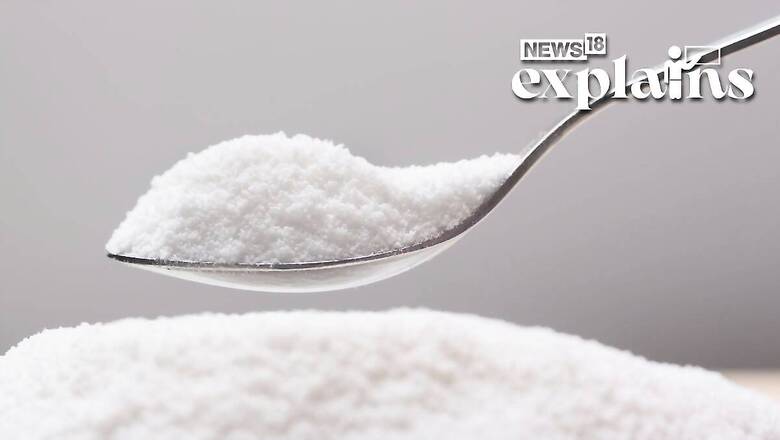
views
The use of aspartame, a commonly used artificial sweetener often known by the brand name Equal, has once again come under scrutiny. An agency of the World Health Organization (WHO) had declared recently that aspartame could potentially be linked to a cancer risk.
As a result, the agency encouraged individuals who consume a considerable amount of beverages containing aspartame to consider switching to water or other unsweetened drinks.
However, the concerns regarding aspartame’s potential health risks are not new. Approximately eight years ago, PepsiCo, in response to customer worries, decided to remove aspartame from its popular diet soda due to its perceived health risks. However, the removal resulted in a decline in sales, leading to aspartame being reintroduced into Diet Pepsi the following year, as per a report in the New York Times.
After the WHO reports, multiple lobbies have come with clarifications, outlining the large amount of aspartame a person of a certain weight group would likely have to consume to face a cancer risk.
According to a report in the Guardian, two organizations affiliated with WHO have accepted that aspartame, an artificial sweetener, has been classified as a “possible carcinogen.” However, these panels have said that it is important to note that the levels of aspartame currently agreed upon as safe for consumption, remain unaffected by this classification.
These assessments stem from separate expert panels within the WHO. One panel evaluates the evidence to determine if a substance poses a potential hazard, while the other assesses the level of real-life risk associated with that substance, as per the report. In the case of aspartame, it has been categorized as a possible carcinogen based on these evaluations.
Despite this classification, the approved levels of aspartame considered safe for consumption remain unchanged. Therefore, consumers can continue to consume aspartame-containing products within the established limits without immediate health concerns, the panels suggested.
When asked about the safety of aspartame, Coca-Cola directed inquiries to the American Beverage Association, the industry’s lobbying body. Kevin Keane, the interim president of the organization, issued a statement saying ‘aspartame was safe.’
What is Aspartame and What All Products is it Used in?
Aspartame is an artificial sweetener composed of two amino acids, aspartic acid, and phenylalanine, joined together by a peptide bond. It entered the market in 1981 as a low-calorie sweetener and is approximately 200 times sweeter than regular sugar, as per a report by CBS News. It is commonly known by brand names such as Nutrasweet, Equal, and Sugar Twin. Aspartame has since become a widely used ingredient in various foods and beverages across North America, Asia, and Europe, as documented in the scientific journal Nutrients.
Here are some examples of foods and beverages that often contain aspartame, as per the report:
- Zero-sugar or diet sodas, including popular brands like Diet Coke.
- Sugar-free gums, such as Trident gum.
- Diet drink mixes, like Crystal Light.
- Reduced-sugar condiments, including Log Cabin Sugar Free Syrup.
- Sugar-free gelatin products, such as Sugar-free Jell-O.
- Tabletop sweeteners sold under brand names like Equal and Nutrasweet.
In the July 13 WHO report, aspartame was declared as a possible carcinogen. In the classification of carcinogens, there are four levels: carcinogenic (known to cause cancer), probably carcinogenic, possibly carcinogenic, and not classifiable. Aspartame is expected to fall into the third category, which denotes a substance that has some potential to cause cancer, although the evidence is not conclusive.
Why Such Conflicting Reports from the WHO?
After the July 13 report, according to a second committee within the WHO, a person weighing 70 kg would need to consume more than twelve cans of Diet Coke per day to exceed the established safe threshold for aspartame.
During a press conference prior to the announcement, Francesco Branca, the head of nutrition at WHO, aimed to provide clarity for consumers who turn to artificial sweeteners as an alternative to sugar. Branca suggested that choosing water instead of cola, whether sweetened or sugared, could be considered as a third option, as per a report by The Guardian.
Firstly, the International Agency for Research on Cancer (IARC), based in Lyon, declared aspartame a “possible carcinogen” in its initial announcement on Thursday. This classification indicates that there is limited evidence suggesting that the substance could cause cancer. However, it does not take into account the quantity of aspartame required for an individual to be at risk, which is assessed by a separate panel, the Joint FAO/WHO Expert Committee on Food Additives (JECFA) based in Geneva.
After conducting its own comprehensive review, JECFA stated that it did not find compelling evidence of harm caused by aspartame. The committee continued to recommend that individuals keep their aspartame consumption below 40mg/kg per day. This guideline was initially established in 1981, and regulatory bodies worldwide offer similar guidance to their respective populations.
Backlash to the Assessments
Meanwhile, there was quick backlash to WHO’s initial findings. The US Food and Drug Administration (FDA) expressed disagreement with the conclusions, and said aspartame is safe for consumption, as per the New York Times.
In response to the WHO’s announcement, major beverage companies have been engaged in contingency planning for months, conducting experiments with various sweeteners. Their objective is to ensure that the taste and quality of diet beverages remain consistent with existing products. However, industry analyst Garrett Nelson from CFRA Research told the publication that beverage companies are unlikely to alter their recipes unless there is a significant decline in consumer demand resulting from the WHO report.
Why is Aspartame’s Use Likely to Continue?
First, Aspartame is low-cost. As per the New York Times, the artificial sweetener has been refined over years, making it a preferred choice for many food and beverage manufacturers.
Approved by the US FDA in 1974, companies have extensive data on its usage. While it enhances certain fruit flavors and is ideal for beverages and gum, it loses sweetness when heated, limiting its use in baked goods. Despite newer sweeteners available, aspartame remains popular due to its affordability and high sweetness intensity.
However, long-standing products like diet sodas have loyal customers accustomed to their specific taste, making ingredient changes potentially off-putting.
Should You Quit Artificial Sweeteners?
Artificial sweeteners are often used by individuals aiming to reduce sugar intake and manage weight. According to experts, incorporating artificial sweeteners into a healthy diet, alongside fruits, vegetables, and less-processed foods, can support weight loss efforts, as per a report by Washington Post. However, it is essential to recognize that zero-calorie or low-calorie sweeteners are not a guarantee for weight loss and should be part of a mindful approach to food choices.
The World Health Organization’s (WHO) review of research indicates that regular consumption of non-sugar sweeteners may be associated with an increased risk of Type 2 diabetes and cardiovascular disease. Although there is no evidence suggesting direct harm, the analysis suggests that these sweeteners do not provide health benefits.
Experts advise against replacing artificial sweeteners with sugar in response to the WHO announcement, as per the report. Instead, they recommend gradually reducing sweetener usage, aiming to eventually rely less on added sugars or artificial sweeteners. Cutting back on sugars or sweeteners for a period and appreciating the natural sweetness of foods like strawberries and carrots is often suggested to reset taste preferences and foster an appreciation for natural flavors.
With inputs from Reuters, The New York Times
















Comments
0 comment